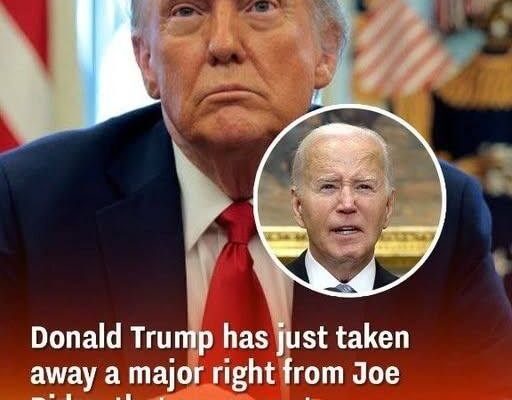
In a development that has caught the attention of political observers, President Joe Biden has recently been affected by a change in a long-standing practice regarding former U.S. presidents. Historically, all former presidents receive certain privileges, including access to security briefings and other intelligence resources intended to keep them informed on matters of national security. However, recent actions by former President Donald Trump have altered this tradition, drawing commentary and debate across the political spectrum.
Background: Security Clearances for Former Presidents
Traditionally, former presidents are granted access to classified intelligence briefings even after leaving office. These briefings are intended to provide continued insight into ongoing international and domestic security issues. The goal is to allow former leaders to offer advice, maintain awareness of global developments, and contribute to the public discourse with the benefit of informed perspective.
Security briefings for former presidents are not merely ceremonial. They reflect a recognition that these individuals carry unique institutional knowledge and experience, which can be valuable in times of national crises or international negotiations. The expectation has been that this access is largely apolitical and consistent, regardless of which party the president belongs to.
Trump’s Recent Decision
Recently, former President Donald Trump announced that he would revoke Joe Biden’s access to security briefings and certain intelligence-related privileges that are normally extended to former presidents. Trump explained the decision by expressing concerns over how sensitive information might be handled. While the move is unprecedented in modern presidential history, Trump framed it as an effort to safeguard national security interests.
Trump also referenced previous reports and assessments related to intelligence procedures and decision-making processes, noting that any access to classified information must be accompanied by careful oversight. In statements made through social media channels, he emphasized the need for responsible handling of classified material and the importance of ensuring that access is not extended without evaluation.
Historical Context
While Trump’s action is unusual, the broader history of security clearances for former presidents provides context for understanding its implications. Since the mid-20th century, former presidents have generally retained access to intelligence briefings, with brief exceptions tied to specific circumstances. For instance, following Woodrow Wilson’s presidency, informal arrangements existed to keep former presidents informed during major international developments, although these were less formalized.
In recent decades, the system has become more standardized. Former presidents such as Jimmy Carter, Ronald Reagan, Bill Clinton, George W. Bush, and Barack Obama all received ongoing briefings on matters of national and international security. These arrangements reflect bipartisan acknowledgment that former presidents can play an advisory or diplomatic role, often consulting with current administrations or providing input during crises.
Reactions from Political Observers
Trump’s revocation of Biden’s security privileges has sparked a range of reactions. Analysts note that the move is unprecedented in its explicit public announcement, though it also reflects broader debates over transparency, accountability, and the proper management of sensitive information.
Some observers suggest that this decision may be interpreted as politically motivated, particularly given the historically reciprocal nature of intelligence access between administrations. Others argue that concerns over the handling of sensitive information are legitimate and require careful evaluation, regardless of the officeholder.
Implications for Presidential Norms
The decision raises questions about the norms surrounding post-presidential access to security briefings. While former presidents are typically given continued access to maintain situational awareness, Trump’s action highlights the potential for such privileges to become points of political contention.
Legal experts note that access to classified information for former presidents is not constitutionally mandated but rather based on executive discretion. This means that, in theory, a sitting president or former president with authority over certain security arrangements can alter or revoke access at their discretion, although such decisions are rarely publicized.
Observers caution that politicizing these privileges could have long-term effects. Future administrations may face difficult decisions when it comes to extending briefings and clearances to their predecessors, potentially impacting inter-administration communication and national security continuity.
Broader Debate on Presidential Access and Accountability
The issue also touches on a larger conversation about accountability and oversight. Some political analysts emphasize that former presidents, while no longer in office, retain influence and can shape public opinion. Consequently, access to intelligence briefings carries both security and political dimensions.
The debate includes questions such as:
- Should former presidents retain automatic access to all classified information?
- How should decisions be made regarding the scope of access?
- What safeguards are appropriate to ensure that information is used responsibly without unnecessary restrictions?
These questions have drawn input from lawmakers, former officials, and policy analysts, many of whom agree that clear guidelines would help prevent disputes in the future.
Comparisons to Other Former Officials
Trump’s decision also mirrors other instances where intelligence access has been restricted or revoked for high-ranking officials outside the presidency. For example, former cabinet members, senior intelligence officers, and military leaders may have their clearances adjusted based on evaluations of security risk, relevance, or administrative needs.
While these measures are less publicized than presidential security privileges, they reflect the broader principle that access to sensitive information carries responsibilities and is contingent upon evaluation by authorized authorities.
Historical Precedents for Revocation
Throughout American history, there have been isolated examples of restricted access to information for former officials. In most cases, these situations were tied to security concerns, conflicts of interest, or perceived risks to national operations.
The difference with the current situation lies in its visibility and political resonance. Trump’s public announcement ensures that the action is not only a matter of internal administrative procedure but also a topic of national discussion, influencing both public perception and media coverage.
Legal and Administrative Considerations
Legal scholars emphasize that security privileges for former presidents are discretionary. There is no constitutional requirement that all former presidents receive ongoing intelligence briefings. Instead, the continuation of such privileges relies on executive authority and inter-agency coordination.
Trump’s move, therefore, operates within existing legal frameworks. While it deviates from precedent, it is not inherently unlawful. It does, however, underscore the need for clear policies regarding the management of former presidents’ access to sensitive national security information.
Public and Media Response
The media coverage of the revocation has been widespread, spanning cable news, digital outlets, and social platforms. Headlines often focus on the historical significance, highlighting that Biden is the first former president in modern times to have such access explicitly revoked by a predecessor.
Public commentary has been divided. Supporters of Trump describe the decision as a reasonable precaution aimed at protecting sensitive information. Critics view the move as politically charged, raising concerns about the erosion of norms that traditionally separate national security considerations from partisan dynamics.
Social media users quickly weighed in, sharing opinions on both sides of the debate. Some emphasize that former presidents must exercise caution when accessing intelligence materials, while others argue that such privileges are essential for preserving institutional knowledge and national stability.
Implications for Future Administrations
The revocation of Biden’s security clearance could have far-reaching consequences for future presidential administrations. It highlights the potential for post-presidential privileges to become politicized and underscores the absence of codified rules governing access.
Observers suggest that future administrations may consider formal policies or legislative frameworks to clarify who receives intelligence briefings after leaving office, under what circumstances, and with what oversight. Such measures could reduce uncertainty and protect the integrity of national security processes.
Broader Reflections on Presidential Norms
The situation also provides an opportunity to reflect on the evolving role of former presidents in American politics. While no longer holding office, former presidents often remain influential figures who can shape public debate, engage in diplomacy, and offer advice to sitting officials.
Ensuring that former presidents are informed without compromising security requires careful balancing. The debate over Biden’s access illustrates the complexities inherent in managing the intersection of privilege, responsibility, and political considerations.
Conclusion
Joe Biden’s recent loss of traditional privileges as a former president—namely access to intelligence briefings and certain security clearances—represents an unprecedented departure from longstanding norms. The decision by Donald Trump has sparked discussion, debate, and analysis about the balance between national security, political discretion, and institutional continuity.
While supporters argue that the move protects sensitive information, critics worry about the precedent it sets for politicizing presidential privileges. Ultimately, the episode reflects larger questions about accountability, transparency, and the role of former presidents in shaping public policy and opinion.
As the political conversation continues, observers will be watching closely to see how future administrations navigate these issues, how norms are maintained or adapted, and how public trust is preserved in matters of national security.



